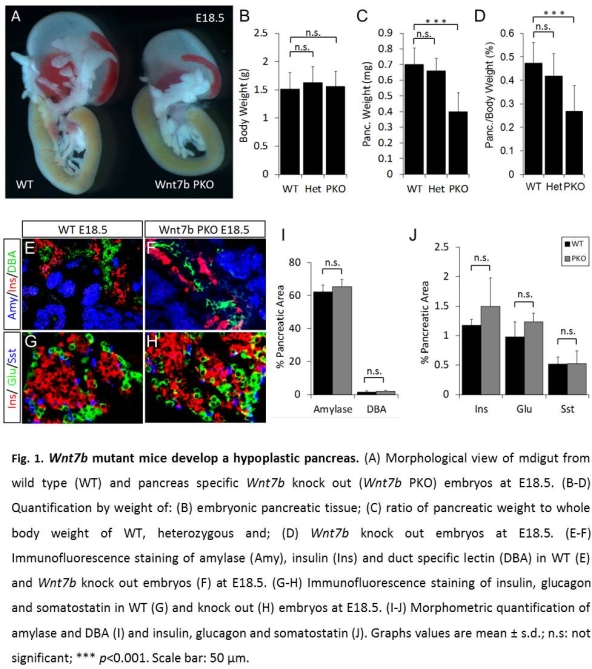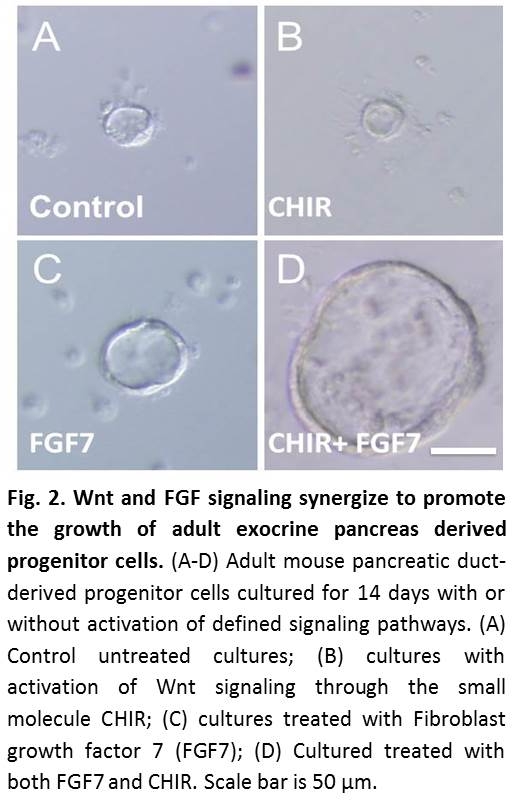FGF and Wnt Signaling in Pancreatic Progenitor and Beta-Cell Growth.
1Surgery, Division of Transplantation, University of Illinois, Chicago, IL
2Stem Cell Biology and Regenerative Medicine, Cleveland Clinic Foundation, Cleveland, OH.
Meeting: 2016 American Transplant Congress
Abstract number: D46
Keywords: Growth factors, Insulin, Pancreas, Proliferation
Session Information
Session Name: Poster Session D: Chimerism/Stem Cells, Cellular/Islet Transplantation, Innate Immunity, Chronic Rejection
Session Type: Poster Session
Date: Tuesday, June 14, 2016
Session Time: 6:00pm-7:00pm
 Presentation Time: 6:00pm-7:00pm
Presentation Time: 6:00pm-7:00pm
Location: Halls C&D
Beta-cell replacement therapy offers
a cure for diabetes, but this is limited by the lack of readily
available supply of cells. Our goal is generate enough beta-cells to meet the
demand for transplantation, by proliferating both mature
beta-cells and pancreatic progenitor cells prior to
differentiation into beta-cells.
Pancreatic progenitor cell growth has
previously been shown to depend on Fibroblast Growth Factor (FGF) from the
mesenchyme. We have identified Wnt7b as a physiological
regulator of pancreatic progenitor cell growth. Wnt7b is present
in the pancreatic progenitor cells, and not the pancreatic
mesenchyme. Genetic deletion of Wnt7b causes
stunted pancreatic growth in mouse embryos. In these embryos, the
mass of the pancreas is reduced to 57% of wild type, but differentiation
proceeds normally (Figure 1). Loss of Wnt7b abolishes canonical Wnt signaling
in the pancreas leading to a reduction in the proliferation rate of pancreatic
progenitor cells by 40%.

Adult pancreatic exocrine cells can assume a progenitor state in vitro. As
FGF had previously been shown to promote pancreatic progenitor cell
growth, we tested the effect of FGF
and Wnt signaling on the growth of adult-derived
pancreatic progenitor cells prior to differentiation into beta-cells.
Wnt alone does not produce a significant effect, while
FGF alone increases pancreatic progenitor cell growth slightly
(Figure 2 C). However FGF and Wnt signaling together induce a pronounced
increase in pancreatic progenitor cell growth, indicating a synergistic effect
between these two pathways in pancreatic progenitor cell growth (Figure 2 D). We are
currently testing the effect of Wnt signaling in promoting the growth of adult
pancreatic beta-cells in vitro.

CITATION INFORMATION: Afelik S, Yonan N, Pool B, Jensen J, Oberholzer J. FGF and Wnt Signaling in Pancreatic Progenitor and Beta-Cell Growth. Am J Transplant. 2016;16 (suppl 3).
To cite this abstract in AMA style:
Afelik S, Yonan N, Pool B, Jensen J, Oberholzer J. FGF and Wnt Signaling in Pancreatic Progenitor and Beta-Cell Growth. [abstract]. Am J Transplant. 2016; 16 (suppl 3). https://atcmeetingabstracts.com/abstract/fgf-and-wnt-signaling-in-pancreatic-progenitor-and-beta-cell-growth/. Accessed December 13, 2025.« Back to 2016 American Transplant Congress
